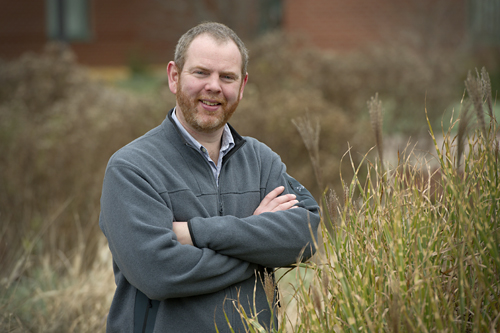In the yard of his downtown Guelph home, Nigel Raine and his wife Alice are cultivating a pollinator-friendly garden with such perennials as penstemon, lavender and bee balm.
“My input tends to be: Is it good for bees? They’re fascinating and beautiful creatures,” says Raine, an internationally recognized expert in pollinator conservation and ecology who joined the University of Guelph in May 2014. “I still find it captivating to go out in the garden and watch them as they decide which flowers to choose. They are capable of impressive feats of learning and memory.”
Raine arrived at U of G last spring as the inaugural holder of the Rebanks Family Chair in Pollinator Conservation, the first research chair of its kind in Canada. The endowed chair is funded by a $3-million gift from The W. Garfield Weston Foundation in the name of Wendy Rebanks, one of the foundation’s directors.
From how individual bees learn to how whole populations work, Raine says the tiny creatures have a lot to teach us about nature and our impacts on the natural world.
A faculty member in the School of Environmental Sciences (SES), he’s studying bee behaviour and pesticide impacts, and will share his findings with a wider audience through education and policy. That audience includes community groups, companies and institutions involved in bee and pollinator conservation across Canada and worldwide.
Since joining the U of G, Raine has appeared in numerous stories by Canadian newspapers and broadcast media to discuss an increasingly fraught topic: What’s happening to our bees?
About one of three mouthfuls of food we eat depends on bee pollination, says Raine. Pollinators also help maintain plant diversity; eight in 10 flower species need pollinators to set seeds and fruit.
Declines in pollinator numbers across Ontario and Canada have been blamed on a number of factors, including pesticide exposure, disease, shrinking habitat and climate change. Raine suggests all of these factors are likely important in pollinator declines, and his research at Guelph will be pushing forward our understanding of how these factors are interacting.
One of the potential culprits for bee declines, the neonicotinoid pesticides, have received a great deal of recent attention. These insecticides kill pest insects by affecting their nervous system, but can also impair the behaviour of beneficial insects, such as bees. “Neonics” were the topic of a recent Quirks and Quarks show on CBC Radio that featured Raine.
Along with eight European researchers, he published a paper in 2014 reviewing the scientific evidence about the impact of neonicotinoids on insect pollinators. As a result of the research, the European Union placed a moratorium on the use of three neonicotinoid insecticides for treating seeds of crops favoured by bees.
“The weight of scientific evidence suggests that we should be concerned about insecticide impacts on bees,” says Raine, who appeared as an expert witness before the environmental audit committee of the U.K. Parliament and has advised the European Food Safety Authority. “Even at comparatively low exposure levels, as can be found in the field, I have seen negative effects of these chemicals on foraging behaviour and colony growth.”
Last fall Raine was also among “40 under 40” global scientists invited to join business and political leaders at the World Economic Forum in China.
He says there’s evidence that pollinator ranges are contracting, and that populations of moths and butterflies are declining each year. Insect habitat is fragmenting not just around towns and cities, but also on farms nearby. “We need to increase food and nesting resources available for a broad range of pollinators.”
Another study he published last year found long-term exposure to neonicotinoids affects bees’ ability to forage for pollen.
“Bees have to learn many things about their environment, including how to collect pollen from flowers. Exposure to this neonicotinoid pesticide seems to prevent bees from being able to learn these essential skills.”
For that study, researchers fitted bumblebees with tiny radio-frequency identification tags to track their flights in and out of their colonies — not unlike e-payment technology for public transit users in the “beehive” of the Greater Toronto Area.
Raine has also used ground-based radar to track bees’ foraging patterns and their ability to solve complex navigational problems.
This follows his widely reported 2012 paper published in Nature providing the first evidence that combined pesticide exposure affects bumblebee behaviour.
Raine completed his PhD at the University of Oxford on the pollination ecology of acacias in Mexico. Before coming to Canada, he was a faculty member in the School of Biological Sciences at Royal Holloway University of London, where he retains a visiting professor position.
Raine has studied bee learning in the lab, in flight cages and at field research stations. He plans to continue that work at Guelph, using campus greenhouses and field stations and working with landowners.
He expects his research will complement studies of honeybees and wild pollinators by other SES faculty members, including the five-year Canadian Pollination Initiative that ended this year. He also hopes to work with Guelph colleagues to adapt sensor and radio telemetry technology for bee foraging studies.
Raine hopes to “help the University of Guelph grow as a centre for pollination conservation knowledge and practice. Guelph is a forward-thinking city with the enthusiasm and capacity to care about big environmental issues.”
